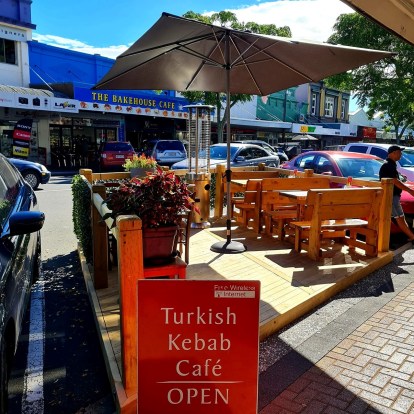In the South they’re used to bracing themselves against a good snow storm and although experienced and resourceful operators initially scrambled for innovative ways to ride out the waves, the Government’s enforced closure and lockdown has hit hard.
However, in true hospitality style, many operators have rallied together and been trying to use their skills to help others in need.
With 45 years’ experience in the New Zealand hotel industry, Queenstown Lakes District councillor Penny Clark has survived a few crises in her time. The former long-time hotel manager, who’s now managing Airbnbs, says the Covid-19 crisis is very different to the likes of the global financial crisis because this time it’s to do with health.
“In my 50 years in hotels I’ve seen some ups and downs. Operators just have to stay in it,” she says.
It’s a whole new ballgame now with Airbnb and so many local homeowners and holiday home owners using that income to help them pay a mortgage.
“We’re starting to see some green shoots from China starting where they’re starting to come out of Covid 19,” says Penny.
Operators around the country have been good at refunding cancellations and Air New Zealand has been great with its policy for cancelled trips, she says.
New Zealand will get through this, but it’s critical that everybody obeys the rules for the lockdown period. “We want this over as quickly as possible and the only way that will happen is if we all do what we’ve been told to do,” she said, the evening of the lockdown. “We may be on war footing but fortunately there are no planes over us dropping air bombs,” she says. “The planes will be back.”
All going well hopefully the lockdown can come off in late April, she says. “We really need to encourage each other to persevere with this self-isolation. It’s absolutely critical that we carry out the instructions. It’ll be worth it and will mean this ends sooner, rather than carrying on for another three or four months in lockdown,” she says.
Penny’s Airbnb bookings are down 100 percent for April. “Communicate with your guests, she says. “Have empathy and understanding with people. They may like to come back next year, or rebook for six months. Keep them on your books and try to encourage them to come another time.”
Many people are understood to have cancelled flights, cruises and holidays credited for some other time in the next 18 months so Penny says she’s hopeful that things can recover. Once this is over things should level off and the country will hopefully settle back into some more reasonableness.”
On a practical note, Penny says staff shouldn’t be left idle to get bored and play computer games in the office. “If you’re a smart hotelier or motelier you might work this system to do something good for the community,” she says. “Send them out into the community to cut wilding pines, or pick up rubbish. Doing good comes back to you.”
In Arrowtown, near Queenstown, People Like Us owners and co-presidents of the Southern Lakes branch of the Restaurant Association of NZ, P.J. Johnson and Sam Gruar, were among the first off the blocks prior to the lockdown. The Level 4 Alert announcement was a huge upheaval with 35 staff employed across their two restaurants, La Rumbla and Slow Cuts, and their newly-opened breakfast eatery café, Good Day.
About half of their staff are sponsored, loyal overseas workers and all part of a tightly-knit team, she says. “I think if we can get through this we will be better business people than ever,” says P.J.
Not ones to lie down and take it on the chin, P.J. and Sam immediately thought outside the square prior to the full lockdown announcement once dinner cancellations starting coming in.
They had pulled together plans for ‘Isolation Party’ in-home dinner and dance packages for 10 with matching wines delivered complete with a waiter to serve, and popular DJ’s Sweet Mix Kids. An airing on Facebook and some local radio promotion had already sparked immense interest in the first few days. They were also preparing to send their La Rumbla chef into homes to cook Spanish food with his special paella pan and people would’ve been able to order anything off the menu. Strict Food Control Plan requirements were to be implemented. “We’ve always been about being proactive rather than reactive,” says P.J. “When disaster strikes we need to stick together and it’s important that staff feel supported,” she says.
For Ben Norfolk, The Bunker co-owner in Queenstown and executive chef of that venue, and Attiqa, it’s all been pretty daunting but he’s playing it day by day. The Government’s rescue package should go some way to assisting, but for Ben the future of his valuable staff, many of them from overseas, is of more concern, especially as he’s sponsored a number of them. “We’re like a family here and I have overseas staff who I’ve sponsored and they’re relying on me. The most important part about retaining my family of staff is that we can all look after each other through all of this and be there to care for each other afterwards,” says Ben.
On the eve of lockdown Ben, was greatly encouraged by news that his faithful team of overseas staff should hopefully have their visas extended until September. With 18 of The Bunker’s 21 staff and almost all of Attiqa’s 19 too this was a huge relief. “Everybody’s looking after each other, talking to each other and supporting each other. We’re all keeping connected,” he says. In the meantime, Ben, like many operators, was trying to do some good for those in need. After a few weeks in lockdown people could be really finding it tough financially. He’d been talking to the local police about whether he and a couple of key staff could prepare food and safely deliver that to people who needed help. Ben was hoping for support from suppliers and supermarkets to come up with a plan that met the safety requirements stipulated by the police of very minimal handling and contact.
Helping self isolators
Central Otago branch accommodation sector chair for Hospitality NZ Carlyn Topp says local self-contained apartments have been on hand and well positioned to assist anybody needing to self-isolate, especially overseas visitors stranded and locals returning from overseas.
At her own Highview Apartments Carlyn has staff dropping fresh linen outside the door for self-isolators to collect. One fully-kitted staff member in protective equipment has been appointed to collect rubbish at a certain time each day from outside the door. That is then placed in another plastic bag and sealed. Everything taken from the room then is put into its own isolation area before processing further to prevent any spread, says Carlyn.
Communication now is key, we need to keep checking in on our teams, with the four week minimum self-isolation time,” she says. That gives everyone a lot of time for thinking. For some they will be worrying about whether they will come out of this with a job. It is very uncertain times for all of us and our normal will certainly be altered,” she says. As a business owner we can use the time to look at how we can adapt our businesses for challenges such as this and look to how we can best recover.
Just because the physical business has had to temporarily close the door doesn’t mean the work stops, she says. “Policies and procedures can be written, business planning and marketing strategies written and put in place. Online meetings can still happen within your teams and social media is a great way to stay connected,” says Carlyn. “Set goals with your team, what would they all like to achieve over the next four weeks, whether it is a book they have been wanting to read, a sport they have wanted to perfect, learn a language or craft. Then celebrate our achievements after this time, who knows how these new learned achievements may shape the future,” she says. “Stay safe and keep your social distance. Kia Kaha.”
Restaurant Association of NZ chief executive Marissa Bidois says many members are focusing on upskilling their teams and continuing with training for themselves during the lockdown period. Prior to that many members were assisting their local communities by handing out meal kits and providing customers with food for the lockdown. “It’s been very challenging for our industry,” says Marissa. “We’re a resilient bunch and we will survive it.”
Darren Lovell, of Queenstown’s Fishbone Restaurant and Bar and more recently Love Chicken was quick to get his message out to ensure customers were reassured about hygiene standards, prior to the lockdown. He had quickly geared up to offer online orders through existing restaurant food delivery business Food on Q for Love Chicken, but that quickly ground to a halt as the Government announced all restaurants and cafes had to close late last month. “This is the worst situation I’ve seen in my 15 years in the business,” he says. “Everybody’s been really encouraging,” he says. And a word from Darren when the lockdown lifts: “Support the locals. Go bungy jumping,” he urges.
Rents have been a big issue. A veteran of 20 years as a Queenstown restaurant operator, Grant Hattaway said in a statement at the start of the lockdown that Queenstown tenants were in the process of communicating with their respective landlords, due to their inability to access or trade in their businesses. Tenants and landlords were hopeful that once the Government moved to Level 4 alert that lease provisions could allow building owners to claim rents from their insurance, which would be a huge help to tenants, he said at the time. “Most landlords have loss of rent insurance,” he said. “It used to be mainly one year, but now most have two years following the Christchurch Earthquake.” He was urging fair and reasonable communication between all parties. “If and when the crisis is finally over, the ability of the landlord to lease a commercial premises to a successful and competent operator will be critical moving forward,” said Grant.
The Government directive to close all non-essential businesses hasn’t been seen as a challenge, but what is necessary to “protect our people”, says Canterbury Restaurant Association branch president, Lisa Levy, of Inati. “These are our families, loved ones, friends, neighbours and guests that support us,” she says. “We will all do everything we can to still be here when this is over.”
Closing their businesses had been very hard for operators. “We have all worked so hard to make our hospitality establishments a success,” she says. The wage subsidy should help many of us keep our people. We need them when this is all over.” Clear communication with teams and being transparent in a time like this is important so that they all know what is happening and how it impacts on their lives,” says Lisa.
“Until we move from Alert Level 4 we are all on lockdown. During this time we will stay in touch with our people and talk through what the possibilities are for reopening. It will depend on each business, but I’m sure there will be some creative initiatives coming from Canterbury in the near future.” “Christchurch businesses are very resilient and they’ve been through a lot with the earthquakes. That will show through,” she says.
In Dunedin Restaurant Association branch president, Olive Tabor, of Patti’s & Cream, made the most of the 24 hours before lockdown last month delivering masses of ice cream from her popular food truck business. Instead of her usual weekly delivery, Olive had been full on delivering for two full days using three cars. Her caramel, mint chocolate and cookies and cream ice cream offered great comfort food for those heading into self-isolation before she had to shut up her online service. Operators have pulled together and been working together to try and get through the crisis, says Olive.
In Nelson, Tasman District branch president Kevin Hopgood said on lockdown night that despite the disbelief and shock for operators they were talking to the authorities to try and rally together to help out with any community assistance.








